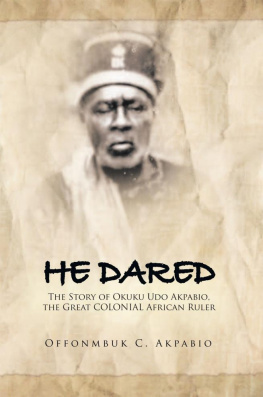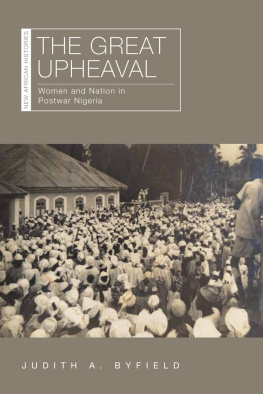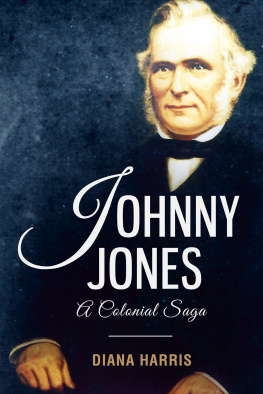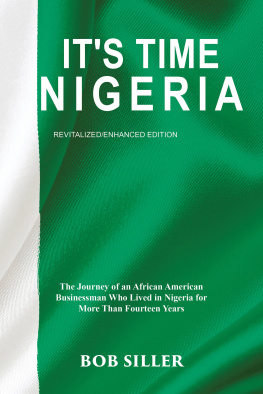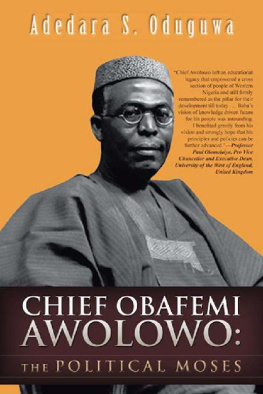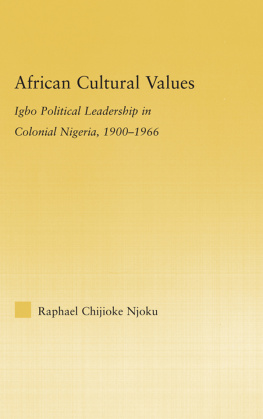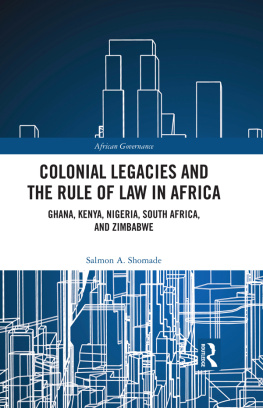HE DARED
The Story of Okuku Udo Akpabio,
the Great Colonial African Ruler
Chief by Colonial Government Warrant;
President of Native Court;
First Paramount Ruler of Ikot Ekpene Division
Offonmbuk C. Akpabio
Copyright 2011 by Offonmbuk C. Akpabio.
Library of Congress Control Number: 2011902210
ISBN: Hardcover 978-1-4568-6738-6
ISBN: Softcover 978-1-4568-6737-9
ISBN: Ebook 978-1-4568-6739-3
All rights reserved. No part of this book may be reproduced or transmitted in any form or by any means, electronic or mechanical, including photocopying, recording, or by any information storage and retrieval system, without permission in writing from the copyright owner.
Xlibris Corporation
0-800-644-6988
www.xlibrispublishing.co.uk
Contents
Offonmbuk Akpabio has told the enthralling story of not just a man but that of his people in a time of transitions. He Dared captures the force of Okuku Udo Akpabio and his timeHe is a force driven by integrity, justice, honour, and derring-do.
Dili Ezughah
This work is dedicated to the Ancient of days
ACKNOWLEDGEMENT
My thanks and gratitude to
Late Dr Edward Udo Akpabio, OON
(head of the Great Akpabio family at the time) for his encouragement and contribution to this work. His gift of the book Ten Africans definitely set the pace for this work.
Chief Godswill Obot Akpabio
(the executive governor of Akwa Ibom State) for giving so much assistance towards successful completion of this work.
Barr. Aniedi Akpabio, Sir Emem Akpabio, and Barr. Ifiok Ekukinam
for spurring me on to take up this challenge and reeling off many stories about their grandfather and great-grandfather.
Engr Nkereuwem Akpabio, Udeme Okure Akpabio,
Ernest Uwa Akpabio, and Senam Akpabio, the foot soldiers who ensured I got the local content materials I needed in my research. They also accompanied me on my many trips to meet with the community people.
Uncle Emman Akpabio,
my same page uncle, for his infectious excitement for this work and whom I perpetually harassed for his comments on the manuscript.
Barr Ibanga Akpabio and his mum Mrs Ime Ibanga Akpabio
for giving me access to some of the materials used for the research.
Okuku Joseph Akpabio and Mr Isong Akpabio
for giving their time to enrich my research and telling many eye-popping stories of the family.
Late Chief Akpan Etok, late Utin Akpabio, Elizabeth Ukut, Akpan Jacob, Chief Ekanem Ema, and numerous others,
whose contributions to this work have made its reality both humbling and exhilarating.
My first editor, Mr Dili Ezughah, the team at Xlibris Publishing
for diligently going through the manuscript; my personal assistant, Eno-Obong Edem, who worked extra hours without complaint to collate and type my research materials; and all the people who worked tirelessly for the successful publication of this work, especially Mr Itohoimo James Inyang.
My mum, Christiana Obot Nwup, Emem, Kennedy, and Utibe,
for the love we share.
Stephanie, Vanessa, and Joanne,
my precious gifts from God, for bringing so much joy to my life and understanding not to come near when Mummys head is buried in her laptop.
Dr Charles George Akpabio
for starting it all and being there through the nights when I just could not sleep, wanting to put my ideas on paper. When I sat forlorn because of writers block, he would patiently read and critique each page, motivating me on. I also thank him for one million other things, culminating in just being Charles.
PROLOGUE
T he task of writing a biography of this magnitude has never been considered easy. Indeed, how does one begin a biography of a larger-than-life personality who shaped the political, social, and even the economic fabric of his time? Can one aptly say enough to summarise such a spectacular and multifaceted individual, whose image and stature wrought an awareness and consciousness that were viewed through different hues, leaving some to think of him as inspiring and progressive and others to think of him as crazy and brazen? He was a man who knocked down barriers by his stance on some very combustible issues that only needed a spark to produce a devastating inferno, and in the same vein, in the art of friendship, he was a master whose words could douse the most threatening of blazes. His life story is motivating, propelling many to dare to achieve great heights which they thought were impossible. He accomplished great things in his lifetime and has done much more since his death.
His full and memorable life paints a complex but beautiful picture, one to be passed from generation to generation.
The present generation can only glean bits and pieces of the life of Okuku Udo Akpabio. Accounts of this great man are gobbled and relished with such passion, albeit leaving a thirst for more and a quest to capture and distill, into a memorable form, the patriarch of the Great Akpabio family.
Earlier on, as I pondered on the many facets of the man, the idea hit me to write a biography on him. As the idea spread, it brought with it palpable excitement, though this was short-lived as the huge challenges lying ahead stared me in the face. Many times, these daunting questions made me wonder if I had let myself into a quagmire. Having shared my dream with a few members of the family and succeeding in awakening their desires alsowhich seemed bigger than mineeveryone had great expectations for the birth of the book. The more excited those involved got, the more shrunken I felt. Nonetheless, I masked my concerns and put on my best sheath of positive thinkingthe midwife was ready, the tools were available, and all challenges were surmounted. Fortunately, in addition, encouragement came from many quarters as there was consensus that this work would give tremendous and invaluable insight into the life of a man who profoundly influenced his generation and still inspires his community today.
And thus began the record of the journey that started in the last quarter of the nineteenth centurya royal birth, surrounded by very daunting circumstances. But not fazed by these, Udo Akpabio knew he had to bolt from those sad circumstances that could hold him prisoner or mar him for life and embrace hard work, integrity, and positive thinking that could make him the man he yearned to be and give him the breath of freedom to tread where mortals dread.
Two of many striking qualities of Okuku Udo Akpabio stood out. One was his insighthe always had a deeper understanding of things that were unfolding and that which were yet to unfold. His intuition drove his reasoning.
The other was the sheer size of his family. He is reputed to have had twenty-nine wives, a good number of them married into the family by Nne Eyen Mboho, his first wife. Some were daughters or sisters of associates or friends, given to him to further engender goodwill; and others were those who had invariably caught the distinguished sages sharp and knowing eyeshe had an eye for good things. Notwithstanding their different routes of entry into the family, all wives would invariably have to pass the basic test of admission into the familyscrutiny and acceptance by Nne Eyen Mboho. He is also said to have had a swelling number of female admirers, some who inevitably became his concubines, en route to becoming wives.
Through these twenty-nine wives, Udo Akpabio begat a large family whose offspring would later form nearly the entirety of Ukana Ikot Ntuen village in now Essien Udim Local Government Area of Akwa Ibom State. Though not without the usual and sometimes unusual squabbles associated with families that big, a tough cord of unity bound them together.
Despite the desire of the Okuku to have all his sons obtain Western education, the reality was starkly different. There are various proponents addressing the possible reasons for some of his children attaining great heights in education while others toddled along and why some never had formal education. Whatever be the reasons for this, one early lesson in being part of a large family is that life is sometimes unfair but ones circumstances beckon an opportunity to turn things around.
Next page
